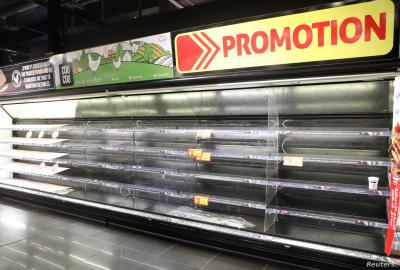Lebanese citizen Suhair (45 years old) rushed to stock up on various food items, including canned goods, rice, grains, beans, vegetable oil, sugar, and some products that do not require refrigeration. She secured three packs of her family’s favorite instant coffee, as she told Al-Sharq Al-Awsat, in anticipation of rising prices.
Lebanese people are worried about the repercussions of the Ukrainian-Russian war, the global fuel crisis, and the instability of the dollar exchange rate in the parallel market on food prices and potential shortages in the Lebanese market. This has led some to stockpile non-perishable items as a preventative measure to shield themselves, if only for a short time, from the looming price hikes.
Despite Suhair’s fears, as an employee and mother of three, she has managed to stock up on what she could amid the straining economic conditions and financial distress that have "hindered her ability to secure sufficient quantities and varieties," she explains.
She clarifies that she stocked long-lasting and commonly used food items while avoiding storing meat and perishable food items due to concerns over spoilage caused by prolonged power cuts. She laments, “Providing food for our children has become a struggle and a type of indulgence that they might soon be deprived of due to additional price increases... Even simple dishes may be denied to us; what will Lebanese people eat?”
Nabil Fahd, head of the Supermarket Owners Syndicate in Lebanon, confirms in a conversation with Al-Sharq Al-Awsat that there has been a rise in commodity prices, explaining that the increase in oil prices directly affects production and shipping costs, in addition to the rising exchange rate of the dollar against the Lebanese pound, whether on the “Sayrafa” platform or in the parallel market, where the dollar's exchange rate has risen by approximately 10%.
While Fahd points out that "the effects of the rise will become apparent within two weeks, and we cannot determine them now while waiting for written offers from suppliers,” Hani Bakhshali, head of the Food Importers Syndicate in Lebanon, explains in a talk with Al-Sharq Al-Awsat that “the prices of food commodities will rise by varying percentages," announcing that "the prices of all food items will be affected by varying percentages ranging from 3 to 5%, and for some categories, it may reach 40% or more."
Bakhshali notes that “the crisis is very significant regarding wheat, oils, and sugar, which will experience a substantial increase in prices, and this will reflect on products such as tuna and mayonnaise, which contain oil, and pasta, which contains flour, among others.” He explains that many categories face global pressure, stressing that some countries’ refusal to export their products to preserve their food security, such as Turkey and Egypt, particularly regarding grains and bulgur, has exacerbated the problem.
He says, “All over the world, wealthy countries are rushing to stockpile supplies and are willing to pay any price to secure their needs, which raises global prices for goods and affects poorer nations, such as Lebanon, which is paying the price for this panic and is forced to pay high prices.”
Lebanon has faced a severe economic crisis since 2019, classified by the World Bank as one of the worst globally, with the Lebanese pound losing more than 90% of its value against the dollar. While most Lebanese have lost their purchasing power due to dwindling salaries, Bakhshali explains that “a citizen with purchasing capacity is stockpiling what they need for about three or four months, leading to reduced supply, high demand, and thus rising prices. Conversely, the needy citizen, who cannot afford to do so, bears the burden of the global crisis.”
The price increase also extends to meat. Khalil Nima, Secretary of the Meat Traders Syndicate in Lebanon, clarifies to Al-Sharq Al-Awsat that the Ukrainian-Russian crisis has caused global meat prices to rise, with increases reaching 15% in exporting nations. Furthermore, rising oil prices have increased shipping, storage, and cooling costs, which will lead to additional price hikes.
Lebanon imports 95% of its meat needs from South America, Brazil, India, and some European countries, amidst a lack of local production. Nima reassures that there will be no interruption of meat supplies in Lebanon, despite some countries closing their borders for exports to safeguard their food security. However, he points out that “meat prices will increase and may reach 350,000 Lebanese pounds (about $15) per kilogram. If oil prices rise further, we will certainly witness additional increases in meat prices,” noting that the current market price for a kilogram of meat in Lebanon ranges between 200,000 and 250,000 Lebanese pounds (between $9 and $11), indicating a potential price increase of between 50% and 75%.
Nima states: “Lebanese people cannot stockpile meat as a preventive measure against price increases for two reasons: the first is the lack of purchasing power among the majority, which has significantly affected the meat market, evident in a 70% drop in imports. A butcher shop that used to sell 200 kilograms of meat a week is now selling 50, and consumer purchasing power has decreased by about 75%.”
The second reason, he adds, is the long hours of power cuts that prevent citizens and butchers from storing meat.




